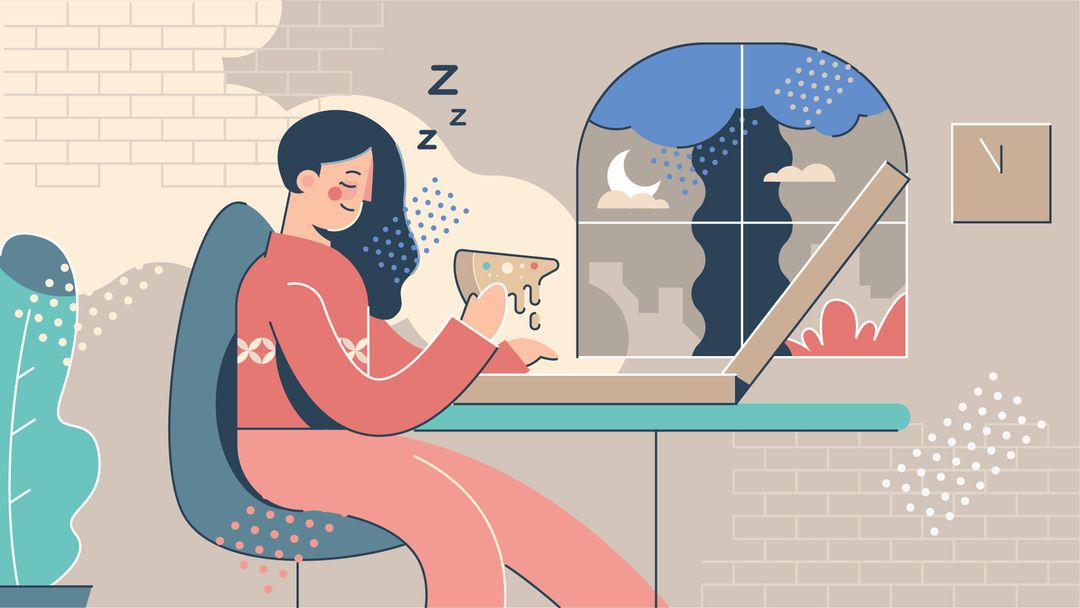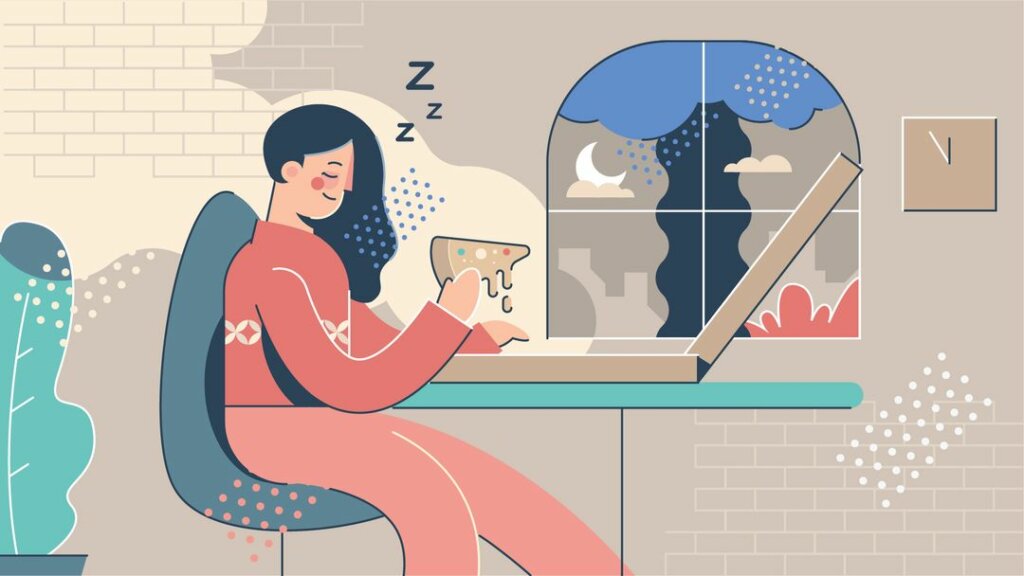Pringles sure got it right with their tagline, “Once you pop, you can’t stop.” There’s something about those damn chips that makes it downright impossible to have just one.
You open up a can thinking you’ll only have a few bites, and the next thing you know, you’re holding the can bottoms up, shoving the last of the crumbs into your mouth. When something like this happens, we often joke, “I don’t know what happened! Something came over me, maybe I was possessed?”
Well, what if we told you that this sleep disorder and out-of-control eating is an actual thing for some people? Know what’s even more mind-blowing? They do it while in a state of sleep.
Sleep-related eating disorder or SRED is characterized by episodes of out-of-control eating and drinking while asleep. Unlike nocturnal eating, people with SRED are unaware of their actions and don’t remember having sleep-eaten in the morning.
Can’t sleep and don’t know why? Check out our Complete Guide to Sleep Disorders with symptoms, causes, and treatments on over twenty types of sleep disorders.
Quick Facts – Sleep Related Eating Disorder
Frequency: 5% of the general population, 9-17% among those with existing eating disorders*
Risk Factors: Substance abuse, pre-existing sleep disorders like sleepwalking or narcolepsy, sleep deprivation, family history, eating disorders (e.g. bulimia, anorexia)
Nature: Physical
Treatment: Medication, sleep hygiene improvement, home and lifestyle adjustments
Symptoms – Sleep Related Eating Disorder
The main distinguishable symptom of sleep-related eating disorder (SRED) is having episodes of binge eating and drinking while in a state of sleep.
SRED can cause fires and physical injury in severe cases that involve the patient preparing and cooking their food. There’s also the danger of eating or drinking toxic substances during a sleep-eating episode.
Below is a list of the commonly observed behaviors around sleep-related eating disorder.
- Getting out of bed to prepare and consume food and drink while asleep
- Daytime tiredness or fatigue due to interrupted sleep from sleep-eating episodes
- Eating inedible things or strange combinations of food
- Loss of appetite during the day
- Little to no memory of eating and drinking while asleep the following morning
- Difficulty being awakened or stopped during an episode
Causes – Sleep Related Eating Disorder
The exact cause of sleep-related eating disorder is still unknown. It’s often studied in conjunction with other pre-existing sleep-related conditions, especially parasomnias like sleepwalking. Below is a list of physical and mental conditions that have been linked to the increased likelihood of SRED.
- Sleep disorders like narcolepsy and sleepwalking
- Daytime eating disorder
- Smoking cessation
- Drug or alcohol withdrawal
- Mental health issues like stress, depression, and anxiety
- Sleep deprivation
Treatment – Sleep Related Eating Disorder
There’s no specific treatment method or medication to cure sleep-related eating disorder. Like in most other sleep disorders, sleep specialists will determine whether there are underlying conditions or disorders that may be causing the symptoms of SRED.
That said, here are some methods for managing SRED symptoms and helping ensure the safety of the patient during sleep-eating episodes.
- Sleep hygiene improvement – Sleep deprivation is a huge factor to the development of SRED. Make sure you follow a regular sleep schedule, and keep your sleep area safe and comfortable so you can get as much sleep as possible.
- Home and lifestyle adjustments – People who sleep-eat are typically only half-conscious when they move around and eat, so put safety measures in place to avoid cooking accidents and physical injuries.
- Medication – If other treatment strategies aren’t effective in curbing the SRED symptoms, your doctor or a sleep specialist may recommend certain medications or ask you to stop taking any medication you’re currently taking.
How You Will Overcome Sleep Related Eating Disorder
If you know someone suffering from sleep related eating disorder, know that there are plenty of things you can do to help manage the symptoms and keep your loved one out of harm’s way.
You can implement some home interior changes to make the kitchen and sleep area physically safer, lock the cupboards, cabinets, and the refrigerator door, and hide knives, blenders, and other potentially dangerous kitchen appliances.
The American Academy of Sleep Medicine study says that SRED patients generally respond well to medication. Not to worry, pharmacological treatment is usually only considered when the other methods mentioned above aren’t working.
Most importantly, the frequency of sleep-eating episodes is directly proportional to one’s level of sleep deprivation. Improving sleep hygiene may be enough to significantly curb SRED symptoms and keep yourself or your loved one safe and sound—in the bedroom and out of the kitchen.
Did you know?
This article is part of our Complete Guide to Sleep Disorders – A resource that will help you get your quality sleep back. Click here to learn more about sleep disorders, their causes, symptoms and how to overcome them.



